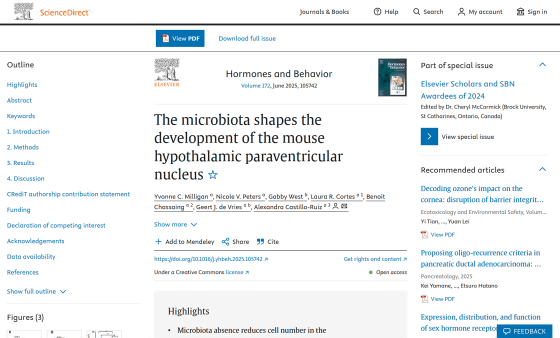Research suggests that mothers' bacteria may affect their children's brain development

The bodies of animals, including humans, are covered with countless microorganisms, and it is known that the resident bacteria that live on the surface of the skin and the intestinal flora are related to health. Research from Michigan State University has shown that the microorganisms that a mother has may influence the brain development of her fetus even before birth.
The microbiota shapes the development of the mouse hypothalamic paraventricular nucleus - ScienceDirect

MSU study finds tiny microbes shape brain development | MSUToday | Michigan State University
https://msutoday.msu.edu/news/2025/08/msu-study-finds-tiny-microbes-shape-brain-development
Your Mother's Germs May Have Influenced Your Brain's Development : ScienceAlert
https://www.sciencealert.com/your-mothers-germs-may-have-influenced-your-brains-development
In recent years, the use of antibiotics during the perinatal period and obstetric care such as cesarean sections have become more common, raising concerns that these practices may prevent the successful transfer of bacteria from the womb to the baby. In the United States alone, 40% of pregnant women receive antibiotics before and after delivery, and one-third of all births are by cesarean section.
'At birth, a newborn's body is colonized by microorganisms as it passes through the birth canal, and birth coincides with a critical developmental process related to brain formation. We wanted to further explore how the arrival of these microorganisms affects brain development,' said Alexandra Castillo-Ruiz, assistant professor in the Department of Psychology at Michigan State University.

Lewis and his team transferred some of the newborn mice born and raised in a germ-free environment to mothers with normal microbiota immediately after birth, rapidly transferring the microbes to the newborn mice's bodies. They then compared the brains of mice that had been consistently raised in a germ-free environment, mice that received the microbes immediately after birth, and mice that had been born and raised in a normal microbiota environment.
The research team focused on a brain region called
In this experiment, we found that mice that were germ-free at birth had reduced neuronal numbers in the PVN, even if the microbes were introduced to them only a few days after birth, and that mice that were consistently raised in germ-free conditions also had reduced neuronal numbers in the PVN.

These results suggest that changes in the PVN caused by microbes passed from mother to child occur in the womb during development. 'Rather than avoiding microbes, we should recognize them as partners in early development. They're helping to shape our brains from the very beginning,' said Lewis.
in Science, Posted by log1h_ik